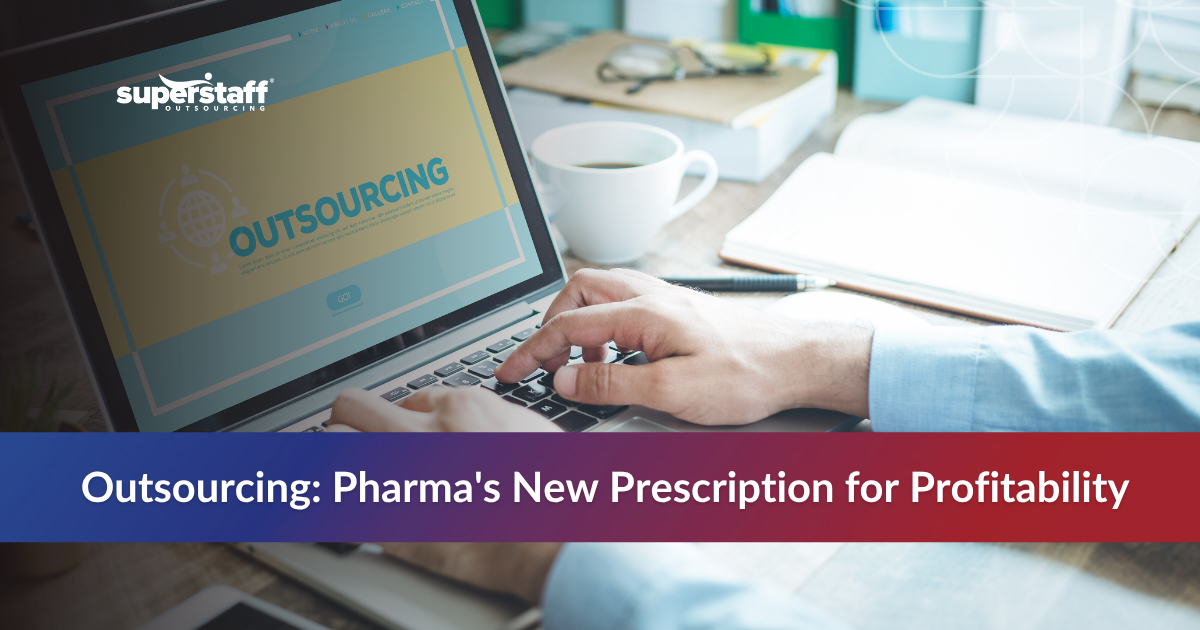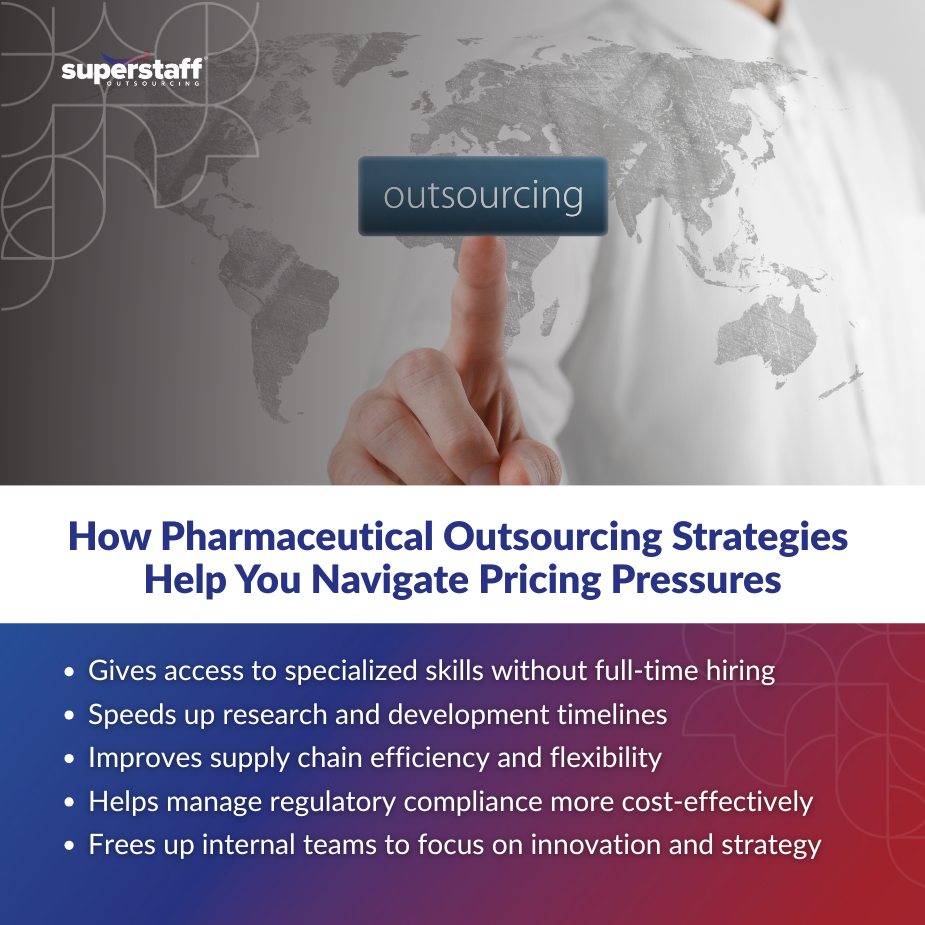
The pharmaceutical industry is under unprecedented pressure to strike a balance between innovation, accessibility, and profitability. As breakthrough therapies and cutting-edge treatments continue to emerge, companies must also answer growing demands to make medications more affordable. Between new government regulations, consumer advocacy movements, and mounting political scrutiny, pharmaceutical firms are being pushed harder than ever to lower prescription drug prices, without compromising the pace of innovation.
In this rapidly evolving landscape, maintaining profitability has become increasingly complex. Traditional models of drug development, manufacturing, and distribution no longer offer the flexibility needed to thrive under tighter margins. That’s why pharmaceutical outsourcing has moved from being a cost-saving tactic to a critical strategic lever. By partnering with specialized external providers, companies can reduce operational expenses, streamline complex processes, and speed time-to-market, all while continuing to invest in groundbreaking research and patient-centered innovations.
This blog examines how leveraging pharmaceutical outsourcing enables companies not only to survive but also to thrive amid pricing pressures. From accelerating R&D to strengthening supply chains and regulatory compliance, we’ll uncover why the future of pharma success is increasingly built on innovative, strategic outsourcing partnerships.
The Growing Pressure to Lower Prescription Drug Prices Is Reshaping Pharma Strategies
The pharmaceutical sector is entering a new era where price cuts are no longer optional—they are expected. On April 15, 2025, President Donald J. Trump signed an executive order aimed at lowering prescription drug prices, building upon initiatives from his first term. It proposes aligning Medicare payments for certain prescription drugs with the actual acquisition costs by hospitals, potentially reducing prices by up to 35%.
Landmark policies, such as the Inflation Reduction Act in the United States, have also introduced Medicare drug price negotiations and capped out-of-pocket costs, placing tremendous pressure on pharmaceutical companies’ traditional pricing structures. Where once companies enjoyed flexibility in pricing models, many now face government-mandated ceilings that limit how much they can charge for life-saving medications.
Adding to these challenges is the rise of global competition. An influx of generic and biosimilar drugs continues to flood the market, offering comparable treatments at a fraction of the cost. As patent protections expire, innovators must compete not just on efficacy but also on affordability. The pressure doesn’t stop at the national level. Global calls for price transparency—fueled by international organizations and patient advocacy groups—are pushing pharma companies to defend their pricing strategies across borders.
Faced with tighter margins and higher stakes, pharmaceutical companies are being forced to rethink their operational models entirely. They must deliver better health outcomes while operating leaner and faster. This environment has made it clear: embracing pharmaceutical outsourcing is no longer a mere option—it’s a strategic necessity.
Why Outsourcing Is a Strategic Solution for Cost Efficiency and Agility
Against this backdrop of financial pressure, pharmaceutical outsourcing has emerged as a clear pathway to maintain operational excellence without spiraling costs. By shifting non-core functions to specialized outsourcing partners, pharma companies can quickly adapt to the dynamic demands of the market while preserving their core strengths in research and innovation.
Outsourcing offers flexible scalability, particularly for clinical trials and drug development. Companies can rapidly adjust resources up or down based on project needs, avoiding the hefty fixed costs associated with maintaining large, in-house teams. This flexibility is especially critical in today’s environment, where the ability to pivot quickly can make the difference between a profitable product launch and a costly setback.
Additionally, the rise of specialized contract research organizations (CROs) and contract manufacturing organizations (CMOs) has enabled pharma firms to access highly skilled resources without the time and expense of building internal expertise. These partners bring not only technical knowledge but also established infrastructure, enabling companies to avoid costly capital expenditures.
Lower labor and infrastructure costs are also a significant benefit. Pharmaceutical companies that strategically offshore administrative, customer support, and back-end operations can leverage global talent pools, freeing their internal teams to focus on innovation and growth.
Ultimately, pharma outsourcing strategies for lower drug prices are not about slashing quality—they’re about achieving operational excellence in a cost-constrained world. The benefits extend well beyond just saving money.

Accelerating Research and Development Through Outsourced Expertise
Clinical research outsourcing is playing an increasingly important role in the pharmaceutical industry’s fight to remain profitable under pressure. Traditionally, research and development (R&D) has been one of the most resource-intensive aspects of bringing a drug to market. Today, outsourcing components of R&D has proven to be a game-changer.
Through partnerships with CROs, pharmaceutical companies can access global research hubs and world-class expertise. This expanded reach allows them to conduct trials across diverse populations and geographies, enhancing the quality of clinical data while reducing recruitment timelines. Faster patient recruitment and trial management directly translate to quicker regulatory submissions, helping companies get to market faster—a critical advantage when every month counts toward recouping investment costs.
Risk-sharing partnerships with CROs are also reshaping R&D economics. Rather than shouldering the full financial burden of trial development, companies can structure agreements that align costs with key milestones, thereby controlling expenses and sharing risks with external partners.
By accelerating the R&D cycle through clinical research outsourcing, companies can not only meet affordability mandates but also maintain a steady pipeline of innovative therapies, ensuring long-term viability and growth.
Navigating Complex Regulatory Requirements With Outsourced Compliance Support
Regulatory hurdles have become increasingly complex in the pharmaceutical sector. Each market has its web of compliance standards, documentation requirements, and approval processes. Keeping pace with these ever-changing landscapes requires significant expertise and resources—two things that many pharmaceutical companies struggle to maintain in-house.
Here again, pharmaceutical outsourcing provides a clear path forward. By outsourcing regulatory affairs functions to specialized firms, companies gain access to experts deeply familiar with regional regulations, submission protocols, and compliance best practices. These specialists can manage everything from clinical trial applications to post-marketing surveillance, ensuring no step is missed.
Efficiently managing submissions, documentation, and audits dramatically reduces the likelihood of costly delays or rejections. Compliance mistakes aren’t just administrative headaches—they can derail drug approvals and lead to expensive penalties.
Moreover, outsourcing enables pharma companies to implement proactive risk mitigation strategies. External partners continuously monitor regulatory changes and emerging requirements, ensuring companies remain compliant without requiring extensive internal resources to stay current.
By partnering with regulatory experts, pharmaceutical companies streamline the pathway to market while mitigating regulatory risks—a critical advantage in today’s high-stakes environment.
Strengthening Supply Chain Resilience and Efficiency With Outsourced Partners
Supply chain disruptions have become a significant vulnerability for pharmaceutical companies, particularly following the COVID-19 pandemic, which exposed the fragility of global logistics networks. Delays in obtaining critical materials, manufacturing bottlenecks, and unpredictable shipping challenges have compelled many firms to reassess their sourcing and distribution strategies.
Outsourcing logistics, procurement, and manufacturing functions strengthens pharmaceutical supply chain resilience. Strategic partners offer access to regional manufacturing and distribution networks, reducing dependence on single-source suppliers and minimizing the impact of localized disruptions.
Outsourcing also enables better inventory management. With external partners managing stock levels and anticipating shortages, companies can avoid costly stockouts that affect both patients and profitability. Advanced tracking systems offered by specialized logistics firms further enhance visibility and operational control.
Cost predictability is another key benefit. By negotiating fixed-rate contracts with third-party manufacturers and logistics providers, companies gain more stable financial forecasting—a critical capability when margins are under constant threat.
Through thoughtful outsourcing, pharmaceutical companies transform their supply chains from vulnerabilities into competitive advantages, supporting profitability and market leadership even amid volatility.
Building a Sustainable, Future-Proof Pharma Business Model With Outsourcing
While today’s pricing pressures are urgent, pharmaceutical companies must also think beyond the immediate horizon. The future of healthcare delivery will be increasingly digital, patient-centric, and value-based. To thrive in this new reality, firms must evolve their operating models accordingly.
Pharmaceutical outsourcing plays a crucial role in enabling this transformation. By partnering with technology firms, telehealth providers, and digital health innovators, pharma companies can integrate telepharmacy services, remote patient monitoring, and personalized medicine programs into their offerings, all without bearing the full development burden in-house.
Diversifying portfolios is equally important. Rather than relying solely on blockbuster drugs, forward-thinking firms are expanding into specialized treatments, preventive care, and diagnostics. Outsourcing allows companies to test and scale these new initiatives more quickly and affordably.
Reducing fixed costs through outsourcing also enhances financial agility. Companies that shed unnecessary overhead are better positioned to weather economic downturns, invest in new opportunities, and respond to emerging patient needs.
Ultimately, pharma outsourcing strategies for lower drug prices don’t just solve today’s problems—they position pharmaceutical companies for sustainable success in an industry that will only continue to demand more for less.
Thriving Amid Pricing Pressure: The Power of Pharmaceutical Outsourcing
As the push for lower drug prices intensifies, pharmaceutical companies that adopt outsourcing strategies will be best positioned to protect their profitability and drive future growth.
Pharmaceutical outsourcing provides far more than cost savings. It enables faster and more efficient R&D, strengthens compliance capabilities, builds resilient supply chains, and supports digital transformation initiatives that will define the industry’s future.
In a world where operational excellence and innovation must coexist with pricing pressures, outsourcing is no longer an optional strategy—it’s essential. By partnering with specialized outsourcing providers like SuperStaff, pharmaceutical firms can navigate today’s challenges while building a leaner, more competitive business model ready for tomorrow’s opportunities.
Ready to transform your pharmaceutical operations for sustainable profitability? Explore outsourcing solutions that align with your strategic goals—and lead your company confidently into the future.






